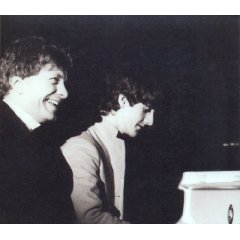It’s been 30 years almost to the day since Factory Records released The Return Of The Durutti Column – in actual fact the first Durutti Column album – following the inclusion of two tracks by an early line up alongside Joy Division, Cabaret Voltaire and John Dowie on the label’s famous 1978 sampler. That’s over three decades since Anthony H. Wilson first fell in love with the music of, as he wrote in the notes to 2004’s The Best Of The Durutti Column, "the diminutive, scrawny, anaemic, willowy and anguished Vincent Gerard Riley", and a generation since Wilson gave the emaciated Mancunian prodigy his characteristically ostentatious but unsuitable moniker, derived from a Situationist poster during the Spanish Civil War.
"What did I know?" Wilson continued. "Genius technique, obviously, but as a philosopher of punk, technique wasn’t my thing; but the kid was good; great even; and he looked near to death which always goes down well in a Velvet Underground world". It was no doubt with this in mind that The Return Of… – a delicate collection full of virtuoso guitar licks, the sound of birdsong and a drum machine as simple as his music was complex – was packaged in sandpaper designed to wreck whatever LP was racked either side of it. Like the dilettante that he was, Wilson saw in Vini Reilly (as he became known) a combination of rock credibility and academic aesthetics that appealed to his intellectual need to straddle both camps.
Wilson’s fascination with Reilly was to last until he died – Reilly was at Manchester’s Christie Hospital when Wilson suffered his fatal heart attack – and the mutual admiration they held for one another rarely faded. Indeed Reilly was the only artist who recorded for all of Wilson’s varied labels, and Wilson helped manage him, though he never stopped arguing that Reilly should keep his mouth shut on stage and let his guitar do the singing. Two and a half years on, Reilly is still inextricably tied to his former mentor through the release of A Paean to Wilson. The tragedy of Wilson’s premature death has provoked the sometimes patchy musician’s finest work in years, and it’s a second tragedy that ‘Mr Manchester’ is not able to hear this 73 minute collection, especially since Reilly has, perhaps out of respect, not sung a note.
A Paean To Wilson opens with a sample of the man himself looped in Steve Reich fashion. "Is this an art form," he asks Reilly, "or are you just a technician?" This self-conscious though nonetheless witty mantra haunts the rest of the record, but the answer lies somewhere between the two. Reilly is a purveyor of technically perfect performances that can indeed by admired as art, but that’s to miss his greatest strength: his honest primitivism. He may scatter guitar notes like silver confetti over his ‘songs’, but the use of samples, often delivered as little more than raw material, and drum patterns, frequently childlike in their deliberate simplicity, imbue his work with a potent sense of nostalgia, rejecting passing musical fads in favour of a timeless, almost classical approach. It’s art, and it’s technique, but it also exhibits that magical ability to secrete itself in your heart as much as your head.
So when Wilson’s voice fades after a minute and ‘Chant’ floats in, distant bass rumblings soon overlaid with Spanish guitars and a gentle wash of synthetic textures, it’s almost impossible not to be moved. Additional vocals – reminiscent of Sami singer Mari Boine’s pure, ethereal voice – add an extra wistful dimension to this opening hymn, reprised later as ‘Darkness Here’. This sense of melancholy pervades the album’s entirety, whether it be in the brooding atmospherics of ‘Requiem’ or the stark but pastoral sounds of ‘Along Came Poppy’, in which he trades guitar for piano and allows Tim Kellet’s elegiac trumpet to step centre stage. Most touching, however, are the eight minutes plus ‘Brother’ and its distant cousin, penultimate track ‘The Truth’. Here Reilly samples Marvin Gaye’s heartbreaking ‘What’s Going On’, originally a paean to a disintegrating world, giving it a tighter and even more poignant focus (much as he did twenty years earlier with Otis Redding on ‘Otis’). "Brother, Brother, Brother," Gaye’s recontextualised voice sings, "there’s far too many of you dying", but it’s Wilson one thinks of, a remarkable feat given the ubiquity of the original.
A Paean To Wilson represents a return to the genius that was stamped all over 1987’s The Guitar And Other Machines and 1989’s Vini Reilly, arguably his last truly exceptional records (though others since have regularly reminded one of Reilly’s capacity for greatness). At that time Reilly was at the height of the little fame that his career has afforded him, having just made significant contributions to Morrissey’s debut, Viva Hate. His innovative use of delay pedals and trademark sparkling, cascading guitar lines had embellished the likes of ‘Late Night, Maudlin Street’ with such success that for a brief moment it looked like Wilson’s commitment might pay dividends. But the spotlight dissolved, and despite Wilson’s ongoing patronage Reilly was left in the shadows. With A Paean to Wilson, Reilly returns the endless favours Wilson did for him, simultaneously sharing his grief and providing Wilson with the kind of eulogy he would have loved more than any: a vocal-free Durutti Column record that justifies every word he uttered about the man he called "his guitarist". He may never have managed to bring Reilly to sustained public attention during his life, but perhaps his death can help put that right.


